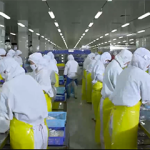SeaWeb, Seattle and shellfish spell sustainability for Taylor Shellfish owner Bill Taylor
On 9 June, even after four full days of engagement at the 2017 SeaWeb Seafood Summit in Seattle, Washington U.S.A., Taylor Shellfish's Bill Taylor was still going strong.
Standing backwards on a southbound bus headed for a mussel and oyster farm that his company operates near Olympia, Washington, Taylor held court. The summit participants who elected to participate in the post-conference, full-day tour of Taylor Shellfish’s operations, listened as Taylor passionately discussed his family’s four-generation history of farming clams and oysters in Puget Sound.
In those four generations, Taylor Shellfish has grown from a one-man gig into a massive aquaculture operation, with USD 125 million (EUR 111 million) in sales in 2015 and more than 10,000 acres of tidal flats under ownership or lease in Western Washington and Canada. It’s clear that Bill Taylor is proud of what his family has accomplished – but it is just as clear that he sees the business’ achievements as the product of a successful partnership between man and nature.
During his talk, that partnership was the main theme for Taylor, and an appropriately chosen topic given his audience. Despite the diversity in professions of the 30 or so seafood industry professionals, including a range of higher-ups at global marine-focused nonprofits, and members of the media, all had participated in the SeaWeb Seafood Summit, a global conference with a sharp focus on identifying problems and solutions pertaining to global seafood sustainability.
As with any company, the business has faced challenges over the years, Taylor told the crowd. However, he said many of the troubles were unique to the shellfish business – particularly environmental problems the business has had to overcome. During the California Gold Rush, oysters were over-harvested, resulting in a boom-bust cycle. In the middle of the last century, environmental pollution – including industrial runoff – killed off a significant amount of the aquatic life in Puget Sound and wiped out most of the shellfish farms in the area. And more recently, in 2009, millions of oyster larvae suddenly died around Washington state hatcheries, hurting production by an estimated 80 percent and costing the industry more than USD 100 million (EUR 90 million). After months of harried research, Taylor Shellfish and the state of Washington realized the die-off was due to ocean acidification, which occurs when oceans absorb carbon dioxide emissions.
During his speech, Taylor said businesses – especially businesses in the seafood industry – needed to stop looking at environmental protection as inherently bad for business.
“At least for shellfish farmers here in the Pacific Northwest, we’ve always been very concerned about sustainability,” he said. “We’ve farmed the same tidelands for 130 years and we’re tied to that property. We need to make sure animals thrive, that the water is clean. So we are naturally interested and involved in trying to protect that and ensure our practices are sustainable, so as to continue to allow our business to continue into the future.”
Participating in this year’s summit reassured Taylor that progress is being made on the sustainable seafood front globally, he said.
“A lot of the fisheries here in North America and Europe are much more sustainable than they were historically,” he said. “And I think we have to be fair and give credit to the environmental community, which has been engaged more productively with the industry. Even when we disagree, it is in a more constructive way than historically it had been, and I think that has made industry improve their practices.”
Taylor credited the SeaWeb Seafood Summit and other seafood sustainability-oriented events for fostering a more productive dialogue.
“I have attended a number of the SeaWeb conferences over the years and have always found them to be really good,” he said. “Most conferences I go to its just shellfish farmers talking to other shellfish farmers, maybe patting themselves on the back a bit too much. But at the summit, there’s always a great mix of environmental folks, industry people, academics and others with real expertise on this issue. And there’s no tensions. I think these conferences are the perfect venue to have productive discussions around important issues surrounding seafood.”
Taylor admitted that shellfish has always had it a little bit easier when it comes to pressure from NGOs, because shellfish farming has “always been seen by the environmental community as a much more sustainable food production type.” He compared his own sector to fish farming, which he said has gotten a lot more attention, and praised the advances that have been made in recent years in changing practices in fish aquaculture to make them more sustainable.
Still, Taylor said it was important for shellfish farmers to stay engaged in dialogue over seafood sustainability and do their part to advance the cause. That’s why he said Taylor Shellfish pursued and achieved Aquaculture Stewardship Council certification for most of its farms, and why the company volunteered to host summit attendees for a daylong tour of its facilities.
“We’re always interested in educating people,” he said. “That should be a really important part of what every seafood business does. Whomever it is, whether it’s NGOs, buyers, or whomever – we should be doing a better job of reaching out to them, educating them and telling our story, because we know we’ve got a really good story to tell. And another part of it is, we need to try and have people understand our needs as well.”
Taking the chance – actually, facing the probability – that such openness will invite criticism is crucial to the future of maintaining the industry’s credibility as a willing partner on the sustainability front, Taylor concluded.
“You have to embrace that there will be criticism, whether it’s from governmental agencies, nonprofits or certification bodies, or even neighbors,” he said. “What we have come to realize is that criticism has actually helped us improve our practices over time. Nobody likes criticism when they hear it, but we’re sure that, many times, it has helped us become a better company and contributor to the future of our industry and planet.”






Share